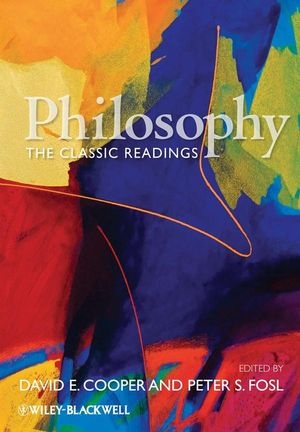
Philosophy
Wiley-Blackwell (an imprint of John Wiley & Sons Ltd) (Verlag)
978-1-4051-4586-2 (ISBN)
- Titel ist leider vergriffen;
keine Neuauflage - Artikel merken
Philosophy: The Classic Readings provides a comprehensive, single-volume collection of the greatest works of philosophy from ancient to modern times. Draws on both Eastern and Western philosophical traditions Arranged chronologically within parts on Ethics, Epistemology, Metaphysics, Philosophy of Religion, and Political Philosophy Features original readings from more than a hundred of the world's great philosophers - from Lao Tzu, Confucius, the Buddha, Plato, Samkara, Aquinas, al-Ghazali, Kant, and Kierkegaard, to Wittgenstein, Heidegger, Sartre, Arendt, and Quine and many others Provides an extensive Timeline of Philosophy for situating historical figures and lines of thought
David E. Cooper is Professor of Philosophy (Emeritus) at Durham University. His many books include World Philosophies: An Historical Introduction (1996, 2002); Existentialism: A Reconstruction ( 1990, 1999); and The Measure of Things: Humanism, Humility and Mystery (2002) Peter S. Fosl is Professor of Philosophy at Transylvania University. Recipient of the 2006 Acorn Award for Kentucky's outstanding university professor of the year, Fosl is co-author with Julian Baggini of The Ethics Toolkit (2007) and The Philosopher's Toolkit (2003).He is also co-editor of the Dictionary of Literary Biography volumes on British Philosophers (2002).
Ethics . Introduction . 1. Plato, Gorgias 482-484, 488-500. 2. Aristotle. Nicomachean Ethics Book 1; Book 10, Chapters 4-8. 3. Epicurus, 'Letter to Menoecus' and 'Leading Doctrines.' 4. Mencius, 'Human Nature is Good.' 5. Hsun Tzu, 'Man's Nature is Evil.' 6. The Book of Chuang Tzu Chapters 9, 13-14. 7. The Bhagavad Gita Chapters 1-5. 8. Cicero, De Finibus III: 1-10, 19-22; De officiis Book I, 1-14. 9. Marcus Aurelius, from Meditations , Book IV (abridged). 10. Santideva, The Bodhicaryavatara Chapter 8 (Verses 89-140). The Second Path: Tsongkapa and Pabongka Rinpoche. 11. Thomas Aquinas, Summa Theologica I-II Questions 55, 58, 61-63. 12. Catherine of Siena, "The Way of Perfection." 13. Pico della Mirandola, "Oratory on the Dignity of Man." 14. Joseph Butler, Sermon 'Upon the love of our neighbour.' 15. David Hume, A Treatise of Human Nature Book III Part 1 Sections 1-2. 16. Immanuel Kant, Fundamental Principles of the Metaphysic of Morals Preface and Section 1. 17. Jeremy Bentham, Introduction to the Principles of Morals and Legislation , Chapter 1. 18. Soren Kierkegaard, Fear and Trembling , Problema I, "Knights of Faith." 19. John Stuart Mill, Utilitarianism ,Chapter 2. 20. Friedrich Nietzsche, On the Genealogy of Morals Essay I Sections 2-14, 16; Gay Science , 125 ("The Madman), 283 ("Preparatory Men"), 381 ("Eternal Recurrence). 21. G. E. Moore, Principia Ethica Chapter 1 Sections 1-2, 5-15. 22. W. D. Ross, The Right and the Good Chapter 2. 23. Charles L. Stevenson, "The Emotive Meaning of Ethical Terms." 24. Albert Camus, "The Myth of Sisyphus." 25. Simone de Beauvoir, The Second Sex , "Conclusion." 26. Jean-Paul Sartre, "Existentialism is a Humanism" (abridged). 27. Hannah Arendt, "On Humanity in Dark Times" (abridged). 28. Michel Foucault, Discipline and Punish , (selection). 29. Judith Butler, "'Woman' as the Subject of Feminism." Epistemology. Introduction . 1. Vasubandhu, Vimshatika (selections on anti-realism). 2. Plato, Meno 81e-85e; Republic , 475e-480a,506d-518c; Theaetetus , 200a-202d. 3. Aristotle, Posterior Analytics , Book I, 1-4 & 31 and Book II, 19; De Anima , Book II, Chapters 1-6, 12; Book III, Chapters 2-8. 4. Sextus Empiricus, Outlines of Pyrrhonism , Book I, 1-16, 18-27, 34. 5. The Book of Chuang Tzu , Chapter 2. 6. The Nyaya-Sutras , from Book I, Chapter I & Book II, Chapter 1, with Vatsyayana Commentary . 7. Nagarjuna, Vigrahavyavartani , 5-6, 30-51. 8. Nicholas of Cusa, On Learned Ignorance; Book I, Chapters 1-4. 9. Michel de Montaigne, from "Apology for Raimond Sebond."(selections on knowledge). 10. Rene Descartes, Meditations on First Philosophy I-III, Principles of Philosophy LXV, and Objections and Replies (Selections). 11. John Locke, An Essay concerning Human Understanding , Book I, Chapter 2, 1-24. 12. G. W. Leibniz, New Essays on Human Understanding , "Preface." 13. David Hume, An Enquiry Concerning Human Understanding , VII, X, XII. 14. Thomas Reid, Essays on the Intellectual Powers of Man , Essay 6, Chapter 5. 15. Immanuel Kant, Critique of Pure Reason , Introduction (2nd Edition), I-VI. 16. Soren Kierkegaard, Concluding Unscientific Postscript , "Truth is subjectivity." 17. Friedrich Nietzsche, "On truth and lies in a nonmoral sense." 18. Charles S. Pierce, "Some consequences of four incapacities (excerpt) and the fixation of belief." 19. Edmund Husserl, The Idea of Phenomenology , Lectures 1-2. 20. Bertrand Russell, "Knowledge by acquaintance and knowledge by description." 21. Moritz Schlick, "On the foundation of knowledge." 22. Ludwig Wittgenstein; Philosophical Investigations 60-133; On Certainty , 1-42, 91-105, 192-284. 23. Martin Heidegger, Being and Time , Section 44, "Dasein, Disclosedness, and Truth." 24. W. V. O. Quine, "Two Dogmas of Empiricism." 25. Richard Rorty, Philosophy and the Mirror of Nature , Chapter VIII, "Philosophy without Mirrors." 26. Jacques Derrida, from Of Grammatology , Chapter 1, "The End of the Book and the Beginning of Writing" (abridged). Metaphysics. Introduction. 1. Lao Tzu, Tao Te Ching , (selections). 2. Heraclitus, on logos and panta rhei . 3. Parmenides, selections on esti . 4. Plato, Phaedrus 245-50; Timaeus 27d. 5. Aristotle, Metaphysics Books I, VII-VIII, XII (selected chapters). 6. Gotama (The Buddha), "Sayings On 'Conditioned Genesis'"; Lalitavistara , XIII 95-117. 7. Nagarjuna, Madhyamaka-Karika , Dedication and Chapter 25. 8. Plotinus, Fifth Enead , First Tractate. 9. Adi Shankaracharya, Vivekachudamani (selections). 10. Achayra Samkara, Brahmasutrabhasya (selections). 11. Ibn Sina (Avicenna), al-Shifa ( The Healing ), Chapters 6-7. 12. Hildegard of Bingen, Scivias , Book I. 13. Ramanuja, Brahma Sutra Bhashya (selections). 14. Thomas Aquinas, from "De ente et essentia." 15. Duns Scotus, Ordinatio I, on the transcendentals. 16. William of Ockham, "Commentary on the Sentences." 17. Giordano Bruno, On the Infinite Universe and Worlds (selections). 18. Rene Descartes, Principles of Philosophy Part I (selections); correspondence with Princess Elisabeth. 19. Benedict de Spinoza, Ethics Part I. 20. John Locke, An Essay concerning Human Understanding Book II, Chapters 8 and 23 (1-11). 21. G. W. Leibniz, Monadology (selection). 22. George Berkeley, The Principles of Human Knowledge , Part I: 1-37. 23. Immanuel Kant, Critique of Pure Reason , Second Edition, "Transcendental Aesthetic," 1-3, 8. 24. G. W. Hegel, Phenomenology of Spirit , Introduction (abridged). 25. Arthur Schopenhauer, The World As Will and Representation , Vol II, Chapter 21. 26. John Stuart Mill, An Examination of Sir William Hamilton's Philosophy , Chapter 11. 27. F. H. Bradley, Appearance and Reality , Chapters 13 and 14. 28. William James, 'The One and The Many.' 29. Bertrand Russell, The Philosophy of Logical Atomism , Lecture VIII. 30. A. N. Whitehead, Process and Reality , Part I, Chapters1 and 2 (selections ). 31. Martin Heidegger, Being and Time , 14-15, 19, 21. 65. 32. W. V. O. Quine, "Ontological Relativity." 33. Jacques Derrida, "Differance," Margins of Philosophy . Philosophy of Religion. Introduction . 1. Vasubandhu, Abhidharmakosabhasya (selections on the path to Enlightenment). 2. Lao Tzu, Tao Te Ching (selections on the Tao). 3. Plato, Euthyphro; Symposium (201c-212c), "Ladder of Loves." 4. Augustine, from The Confessions (on conversion); "Of the Freedom of the Will." 5. Boethius, The Consolation of Philosophy , Book IV, Prose 6, "On Fate and Providence." 6. Anselm, Proslogion , "The Ontological Argument." 7. Al-gazali, Incoherence of the Philosophers (selections on philosophy). 8. Ibn Rhsd (Averroes), The Decisive Treatise concerning the Nature of the Connection between Religion and Philosophy (selections on two discourses). 9. Moses Maimonides, Guide of the Perplexed (on negative theology). 10. Thomas Aquinas, Summa theologiae I, 1, 2; (five ways, faith and reason). 11. Duns Scotus (selections on voluntarism). 12. Hasdai Crescas, The Light of the Lord (selections). 13. Erasmus, In Praise of Folly (selections including "foolosophy"). 14. Gottfried Leibniz, Theodicy (selections). 15. Pascal, "The Wager." 16. Samuel Clarke, A Discourse concerning Natural Religion (selections). 17. David Hume, Enquiries concerning Human Understanding X, "Of Miracles"; and from Dialogues concerning Natural Religion (selections). 18. Immanuel Kant, "Dialectic of Reason," (critique of cosmological and ontological argument). 19. William Paley, "The Teleological Argument." 20. Soren Kierkegaard, Fear and Trembling , Problema I, "Knights of Faith.". 21. Sigmund Freud, The Future of an Illusion (selections). 22. Ludwig Wittgenstein, "Lectures on Religious Belief" (selection). 23. Bertrand Russell, "A Free Man's Worship." 24. William James, "The Will to Believe" (abridged). 25. Alvin Plantinga, "The Christian Argument Against Evolutionary Naturalism." Political Philosophy. Introduction . 1. Lao Tzu, Tao Te Ching (selections on the Tao and the ruler). 2. Confucius, Analects (selections on Li and the ruler). 3. Han Fei Tzu, "The Two Handles." 4. Xenophon, Memorabilia; Book I, Chapters 4-8; Book IV, Chapter 4. 5. Plato, Republic Books II (origin of the state), V (three waves), VIII (degeneration of states). 6. Meng Tzu, Book of Mencius , Books I-II. 7. Aristotle, Politics I, II:1-6, VII. 8. Cicero, De re publica VI:ix-xxvi, "The Dream of Scipio." 9. Thomas Aquinas, Summa theologica , I-II, Questions 90-105, De regimine principum (selection on tyranny). 10. Marsilius of Padua, Defensor pacis; Discourse I, Chapters VIII, X, and XII; Discourse II, Chapters VIII, IX. 11. Machiavelli, The Prince , XIV-XIX, and XXV. 12. Hobbes, Leviathan , Chapters 13-15, 18, 21. 13. Benedict de Spinoza, Theological-Political Tractatus , Part IV, Chapter 16 and 20. 14. Mary Astell, A Serious Proposal to the Ladies (selections). 15. John Locke, Second Treatise of Government , Chapters 1-9. 16. Jean-Jacques Rousseau, The Social Contract (selection). 17. David Hume, An Enquiry concerning the Principles of Morals III; from Essays, "Of the Origin of Government" and "Of the Original Contract." 18. Immanuel Kant, Perpetual Peace. 19. Thomas Jefferson, "Declaration of Independence." 20. The Constitution of the United States . 21. James Madison, Alexander Hamilton, John Jay, The Federalist Papers , 10, 51. 22. The Declaration of the Rights of Man and the Citizen . 23. Edmund Burke, Reflections on the Revolution in France (selections). 24. Thomas Paine, The Rights of Man (selections). 25. Mary Wollstonecraft, Vindication of the Rights of Woman (selection). 26. Jeremy Bentham, Anarchical Fallacies . 27. John Stuart Mill, On Liberty , Chapter 5. 28. Friedrich Engels and Karl Marx, The Communist Manifesto; Chapter 1, "Bourgeois and Proletarians"; Chapter 2, "Proletarians and Communists"; and "Theses on Feurbach." 29. Emma Goldman, "Anarchy: What it Really Stands For." 30. Mohandas Gandhi, remarks on "Satayagraha." 31. United Nations "Declaration of Human Rights." 32. Michael Oakeshott, "Rationalism in Politics" (abridged). 33. John Rawls, A Theory of Justice , "The Original Position," "The Reasoning Leading to the Two Principles of Justice." 34. Robert Nozick, Anarchy, State, and Utopia , Chapter 7, Section 1: "Entitlement Theory"; "Historical Principles and End-Result Principles"; "Patterning"; "How Liberty Upsets Patterns." 35. Michel Foucault, "The Subject and Power." 36. Catherine MacKinnon, "Toward Feminist Jurisprudence," Towards a Feminist Theory of the State .
| Erscheint lt. Verlag | 7.8.2009 |
|---|---|
| Reihe/Serie | Wiley Desktop Editions |
| Verlagsort | Chicester |
| Sprache | englisch |
| Maße | 173 x 243 mm |
| Gewicht | 1836 g |
| Themenwelt | Geisteswissenschaften ► Philosophie ► Allgemeines / Lexika |
| ISBN-10 | 1-4051-4586-2 / 1405145862 |
| ISBN-13 | 978-1-4051-4586-2 / 9781405145862 |
| Zustand | Neuware |
| Haben Sie eine Frage zum Produkt? |
aus dem Bereich


